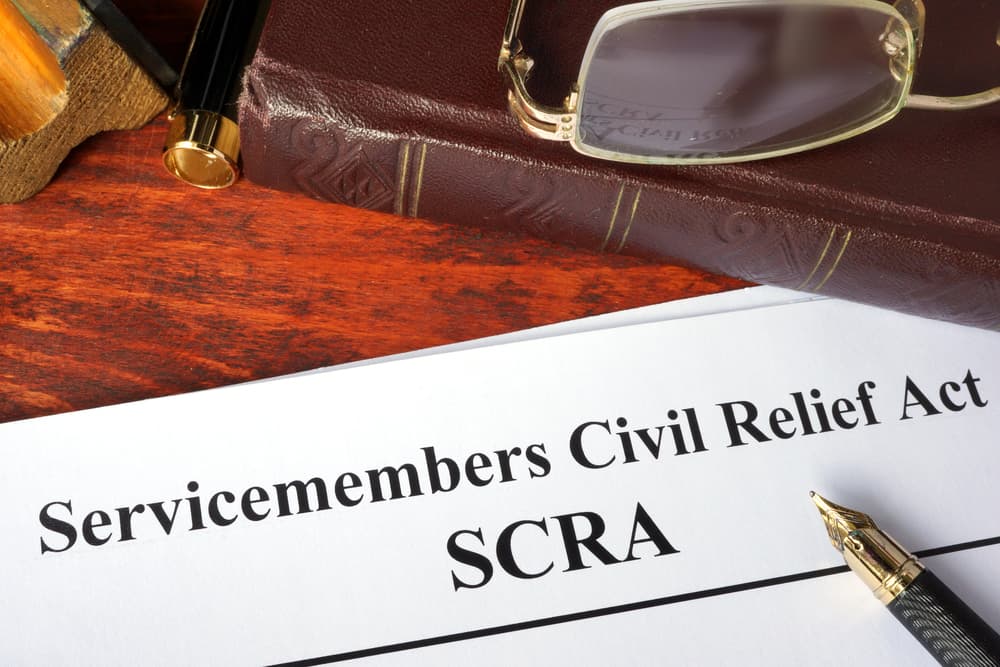A divorce can be a challenging journey, particularly for military members and their families. For those stationed overseas or away from home, divorce can become even more difficult.
If you're a military member contemplating divorce in South Carolina, it's important to understand how the state's laws may impact your situation.
South Carolina's divorce laws govern grounds for divorce, division of marital assets, and child custody arrangements. However, specific rules apply to real estate located out of state or if children reside in another state. While this may seem overwhelming, military members can often pursue a divorce in South Carolina without returning for court proceedings, depending on their unique circumstances.
Discuss your options with an experienced South Carolina military divorce attorney today.
Divorce Jurisdiction in South Carolina for Military Families

To initiate a divorce in South Carolina, individuals must meet specific residency criteria, which are slightly adapted for military families to accommodate their mobile lifestyle.
A military divorce may be filed in South Carolina if:
- Either spouse resides in the state,
- The military member is stationed in South Carolina, or
- South Carolina is declared as the legal residence of the military member, often determined by the state listed for tax purposes.
These provisions ensure that military members and their spouses can actively file for divorce in a state where they have significant ties, even if they are currently residing elsewhere. Jurisdiction and residency can be confusing, so seek advice from a military divorce lawyer.
Legal Protections Under the Servicemembers Civil Relief Act (SCRA)

The SCRA provides essential protections to military personnel, recognizing the unique challenges and duties of serving the nation. This Act allows for the postponement of legal proceedings, including divorces, for the service member's active duty and an additional 60 days afterward. This protection aims to enable servicemembers to devote their full attention and energy to their military responsibilities without the added stress of ongoing legal disputes.
Challenges with Service of Divorce Complaints
One significant hurdle in proceeding with a military divorce is the service of the divorce complaint, especially if the service member deploys. The law provides a solution by allowing military personnel to receive service through military channels., provided that the service member consents to this method of service. This consent is crucial as it respects the servicemember's rights while facilitating the legal process. Your military divorce attorney can handle this process for you.
Expanding on the Process
When considering filing for divorce in South Carolina as a military member or spouse, understanding these jurisdictional and procedural nuances is crucial, as they actively serve to protect those who serve our country. However, they also require careful navigation to ensure the process proceeds fairly and efficiently.
Consulting with a legal professional who has experience in military divorces can provide valuable guidance and support through this process. They can guide your understanding of how the SCRA may affect your divorce timeline and the steps you can take to protect your rights and interests throughout the proceedings.
Additionally, understanding the importance of establishing legal residency and how it impacts your divorce, tax implications, and other legal matters is essential for military families going through a divorce in South Carolina. A military divorce lawyer can also assist with the challenges of serving divorce papers when one spouse deploys, ensuring that the process respects both the servicemember's legal rights and the court's procedural requirements.
Understanding the Division of Retirement Benefits in Military Divorces: A Guide to the Uniformed Services Former Spouses' Protection Act
Divorce proceedings often involve the division of assets, including retirement benefits. For military families, specific federal legislation, known as the Uniformed Services Former Spouses' Protection Act (USFSPA), actively governs the division of military retired pay codified at 10 U.S.C. 1408. This Act is crucial in handling retirement benefits during a divorce, dissolution, annulment, or legal separation involving a military member.
Key Provisions of the USFSPA
The USFSPA recognizes the authority of state courts to distribute military retired pay to a spouse or former spouse in divorce proceedings. However, it's important to note that the Act does not automatically entitle a former spouse to a portion of the member's retired pay. Instead, a court order must actively establish the entitlement as part of the final divorce decree or another relevant legal document. The Act also outlines procedures for enforcing orders related to child support, alimony, and division of retired pay.
Enforcement and Division of Retired Pay
For a former spouse to be eligible for a portion of the military member's retired pay, the court order must expressly provide for such division. The awarded amount can be specified in dollar figures or as a percentage of the member's disposable retired pay, which is the gross retired pay minus allowable deductions.
The 10/10 Rule
A significant aspect of the USFSPA is the "10/10 rule," which requires the military member and the former spouse to have been married for at least ten years, during which the member performed at least ten years of creditable military service. This rule specifically applies to the division of retired pay as property and does not affect the enforcement of child support or alimony awards.
Jurisdictional Requirements
The state court must have jurisdiction over the military member, established through the member's residence, domicile, or consent to the court's jurisdiction demonstrated through affirmative action in the legal process. This essential requirement actively ensures that the court possesses the authority to issue orders for the equitable division of the military retired pay, safeguarding the fairness and legitimacy of the legal proceedings.
Limits on Payments
The USFSPA actively limits the amount payable to a former spouse, establishing a maximum of 50 percent of the member's disposable retired pay for the division of retired pay as property. In cases involving the division of retired pay and garnishment for child support or alimony, the total amount cannot exceed 65 percent of the disposable retired pay. This statutory framework provides a clear guideline for the fair and proportionate distribution of military retired pay in divorce proceedings, ensuring a balanced approach to financial support obligations.
Application Process
Former spouses seeking to enforce an award under the USFSPA must submit a completed application form (D.D. Form 2293) and a certified copy of the court order to the Defense Finance and Accounting Service (DFAS). The application must clearly state the awards being sought and, if applicable, prioritize them in case of insufficient funds to cover multiple awards.
Special Provisions
The USFSPA includes provisions for former spouses who are victims of abuse by members who lose their right to retired pay. In such cases, the former spouse may enforce an order dividing retired pay as property under specific conditions outlined in the Act.
Understanding the Survivor Benefit Plan (S.B.P.) for Former Spouses in Military Divorces

The Survivor Benefit Plan (S.B.P.) is an essential consideration for military families going through divorce, especially concerning the financial security of former spouses. The S.B.P. allows military members to provide a continued source of income for their beneficiaries in the event of their death, ensuring that loved ones are financially protected.
Electing S.B.P. Coverage for a Former Spouse
A military member can elect to provide S.B.P. coverage to a former spouse initially designated as a "spouse" beneficiary under the plan. This election is contingent upon the divorce after the member becomes eligible to receive retired pay. The provision allowing the election of former spouse coverage under S.B.P. actively ensures that the financial well-being of former spouses can be secured, recognizing the contributions and sacrifices made during the member's military service.
Deemed Election by a Former Spouse
The S.B.P. allows a former spouse to initiate coverage on their behalf through what is known as a "deemed election." For a valid election, the individual must make the election within one year after issuing the divorce decree or court order mandating S.B.P. coverage. This opportunity acknowledges the rights of former spouses to secure financial protection post-divorce.
Converting Existing S.B.P. Coverage
To transition existing spouse S.B.P. coverage to former spouse coverage, the retiree and the former spouse must complete and submit a D.D. Form 2656-1, Survivor Benefit Plan (S.B.P.) Election Statement for Former Spouse Coverage. This form is critical for documenting the election. It must detail the basis of the election—whether under a court order, a mutual agreement between the parties, or a voluntary decision by the retiree. The distinction in the election's basis determines the retiree's ability to modify former spouse coverage.
Submission Deadline
The completed D.D. Form 2656-1, indicating the transition of S.B.P. coverage from spouse to former spouse, must be submitted within one year from the date of the divorce decree or court order that mandates the coverage. This deadline underscores the importance of timely action to ensure that the former spouse's election for S.B.P. coverage is recognized and processed effectively.
Importance of S.B.P. Coverage for Former Spouses
The S.B.P. is a crucial safety net for former spouses, providing them financial security and peace of mind. For military retirees, electing S.B.P. coverage for a former spouse can reflect ongoing responsibility and acknowledgment of a shared life despite the end of the marriage. It is an important component of the financial planning process in military divorces, ensuring that the needs of both parties are considered and addressed.
Navigating Health Care After a Military Divorce: The Continued Health Care Benefit Program (CHCBP)
The transition from military to civilian life brings about many changes, not least the shift in healthcare coverage. Understanding how to maintain health coverage after losing TRICARE eligibility is crucial for individuals going through a military divorce. The Continued Health Care Benefit Program (CHCBP) offers a valuable solution, providing temporary transitional health coverage. This guide aims to expand on the essentials of CHCBP, its benefits, eligibility, and how it serves as a crucial bridge during this transition period.
Overview of CHCBP
Administered by Humana Military Health Care Services, Inc., CHCBP is a premium-based program that offers transitional health coverage for 18 to 36 months after TRICARE eligibility ends. This program particularly benefits former military spouses and family members navigating the complexities of health care continuation post-divorce.
CHCBP Benefits and Coverage
CHCBP extends benefits comparable to those provided under the TRICARE Standard, ensuring that individuals can access the same range of providers and adhere to similar program rules. The primary distinction of CHCBP from TRICARE is its premium-based structure. Participants in the CHCBP must pay premiums to maintain their coverage, a key factor to consider when planning for health care needs post-divorce.
Eligibility and Enrollment
Eligibility for CHCBP is contingent upon the loss of TRICARE eligibility, either through divorce or other qualifying events. Individuals interested in continuing their health care coverage through CHCBP must act swiftly, as enrollment in the program must occur within 60 days of losing TRICARE or Transitional Assistance Management Program (TAMP) coverage. This narrow window underscores the importance of being proactive and informed about your healthcare options following a change in marital status.
Duration of Coverage
CHCBP provides an essential coverage bridge, offering benefits for a transitional period of 18 to 36 months. This duration offers a critical buffer for individuals transitioning to civilian health plans, ensuring continuous health care coverage during this adjustment phase. The length of coverage under CHCBP can vary, so it's important to understand the specifics of your eligibility and how long you can expect to receive benefits.
Premiums and Costs
While CHCBP offers familiarity and comprehensive coverage similar to the TRICARE Standard, the requirement to pay premiums distinguishes it from the standard military health benefits. The Department of Defense establishes premium rates for CHCBP, which can change annually. Prospective participants should carefully review the current premium rates and assess their financial readiness to take on these costs as part of their post-divorce planning.
Seeking Guidance on Your Military Divorce in South Carolina? A Divorce Lawyer is Ready to Support You

If you need legal assistance, consider contacting a divorce attorney with a strong background in handling military divorce cases. They should be knowledgeable about the practices in your area and experienced in dealing with the courts and legal system in South Carolina. Ensuring an attorney by your side can help protect your interests and achieve the best outcome in divorce proceedings.
Remember, the right family law lawyer in Myrtle Beach, SC can provide the support and guidance you need during this challenging time. Don't hesitate to seek legal advice to navigate your military divorce confidently.







